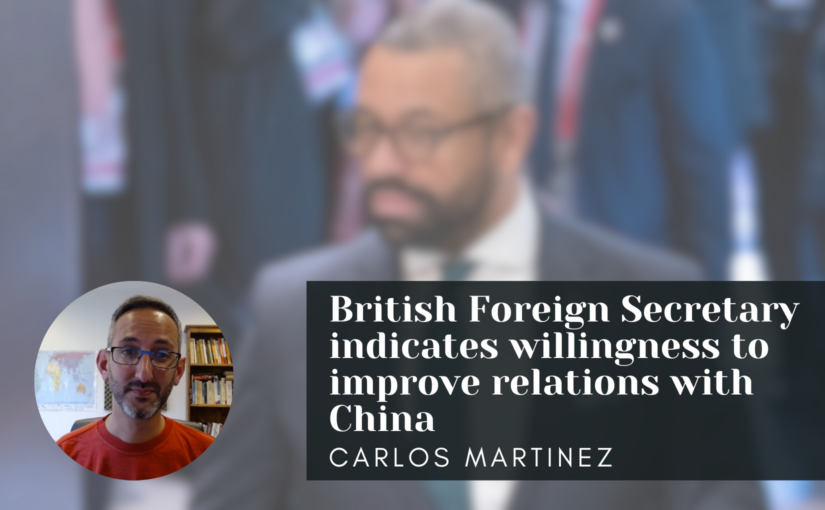In this brief article, based on comments given to the Morning Star, Friends of Socialist China co-editor Carlos Martinez analyses the speech about UK-China relations given by Foreign Secretary James Cleverly on 25 April 2023. Carlos states that the speech indicates “a partial – limited but nonetheless important – move by the British government to return to a more sane policy with regard to China.”
British Foreign Secretary James Cleverly’s speech on UK-China relations represents a partial – limited but nonetheless important – move by the British government to return to a more sane policy with regard to China.
Cleverly issues a reasonably stern rebuke to the China hawks in his own party (and indeed the opposition) by stating clearly that he doesn’t want a New Cold War; that the West and China are not compelled to fall into a Thucydides Trap; that Britain’s membership of the Asian Infrastructure Investment Bank has been beneficial; and that cooperation with China on the issues of climate change, pandemics and nuclear proliferation is indispensable. He makes a point of congratulating China on its extraordinary achievement of lifting 800 million people out of poverty.
Needless to say, these useful comments are couched in the usual red-scare tropes about China’s “ruthless authoritarianism”, human rights in Xinjiang, and so on. On the one hand, Cleverly claims not to want a Cold War; on the other hand, he stupidly parrots all the propaganda that supports and justifies that Cold War. This should be seen as a loyalty pledge to Washington, and as a concession to the deluded hard-right China hawks in the British government.
The geopolitical context for Cleverly’s speech is obviously the developing trend of European countries seeking to distance themselves from the US’s anti-China strategy. The highest point of this trend so far has been Macron’s trip to Beijing earlier this month and the remarks he made about the need to develop a sovereign French foreign policy. Certainly Macron went much further than Cleverly – saying (consistent with international law) that the Taiwan question is an issue for Chinese people on both sides of the Strait. Nevertheless, it’s noteworthy and welcome that Britain sees the need to shift in the direction of a more independent and sensible policy.
A Global Times editorial fairly characterised Cleverly’s speech as “a correction of the UK’s aggressive line involving China in the past, and an attempt to return to British balanced diplomatic tradition.” However, the editorial sensibly calls for realistic assessment: “We welcome Cleverly’s positive remarks, at least it can be seen a little possibility of a turnaround in China-UK relations, but we remain cautious about how much it will be implemented in the UK’s China policy.”
Foreign Ministry spokesperson Mao Ning echoed this sentiment, calling on Britain to “be prudent in its words and actions” and to “do more things that are conducive to the development of China-UK relations and world peace and stability.” She further warned that “bloc politics and the Cold War mentality are against the trend of history and do not serve the interests of the UK or any other party in the world.”
The Post-Brexit political consensus has for several years been that Britain’s fundamental interests lie in appeasing the US on foreign policy matters, in the hope that this will help bring forth a comprehensive US-UK trade deal. Cleverly’s speech – and Sunak’s refusal to define China as a ‘strategic threat’ – indicate a growing understanding that Britain needs investment from, and trade with, China, and that ‘decoupling’ is a dead end. The British people will benefit greatly if this understanding can blossom into a strategy of cooperation and mutually-beneficial relations.

